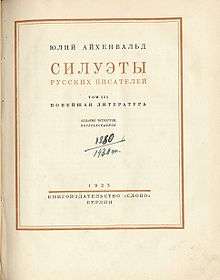Yuly Aykhenvald

Yuly Isayevich Aykhenvald, Aikhenvald, or Eichenwald (Russian: Ю́лий Иса́евич Айхенва́льд; 24 January 1872 – 17 December 1928) was a Russian Jewish literary critic who developed a native brand of Aestheticism and went down in history as "a Russian version of Walter Pater" (Vladimir Nabokov's assessment).[1]
Life
Aykhenvald was born in Balta, Russian Empire into a rabbi's family and attended the New Russia University in Odessa, where he developed a lasting interest in Schopenhauer's ideas. After moving to Moscow in 1895, he employed a number of pen-names, including Yu. Ald (Ю. Альд) and B. Kamenetsky (Б. Каменецкий).
Aykhenvald followed Schopenhauer in that art is irrational and that the essence of it can be reached only by dint of intuition. He panned most Russian literary critics for applying social and utilitarian criteria to literature and for producing political journalism in the guise of artistic criticism.
Following the Russian Revolution, and the publication of his essay 'Revolution: the leaders and the led' (Revoljucija: ee vozhdi i evdomye'), where he attacked Leon Trotsky personally, Aykhenvald was briefly arrested and then, in 1922, exiled to Germany[2] where he involved himself in several high-profile émigré publications, including the newspaper Rulj. His life was cut short by a tram accident in Berlin.
Family
- Alexander Aikhenvald (1904–1941), his son, an economist and member of Bukharin's school
- Boris Aikhenvald (1902-1938), his son, a translator and philosopher
- Tatiana Aikhenvald (1900-1963), his daughter, a well-known teacher of mathematics
- Yury Aikhenvald (1928–1993), his grandson, a poet, a writer and a dissident
- Alexandra Aikhenvald (born 1957), his great-granddaughter, a linguist
- Natalia Shvedova (1916–2010), his natural daughter, a lexicographer and an expert on Russian syntax
Books
- In his best-known book Silhouettes of Russian Writers (1909) Aykhenvald offers a series of memorable impressionistic sketches of major Russian authors and their works. His argument that Ivan Turgenev was a second-rate writer caused an outcry in the conservative literary circles.
Quotes
- "There are no literary movements, only writers. There is no society, only individuals".[3]
Online resources
- Русское зарубежье (Золотая книга эмиграции) Первая треть XX века. Энциклопедический биографический словарь. М., 1997. 748 с. at apologetika.com
- Русский биографический словарь at www.rulex.ru
- Онлайн-энциклопедия Кругосвет at www.krugosvet.ru
- Биографический указатель at www.hrono.ru
Notes
- ↑ "Russian version of Walter Pater - Google Book Search at books.google.com
- ↑ Chamberlain, Lesley (2006). The Philosophy Steamer. Great Britain: Atlantic Books. ISBN 978 184354 093 9.
- ↑ Львов-Рогачевский. История литературы и методы ее изучения // Словарь литературных терминов. Т. 1. — 1925 Archived May 29, 2008, at the Wayback Machine. at feb-web.ru